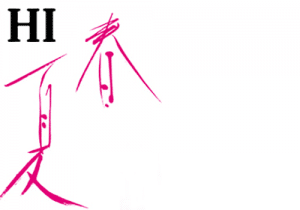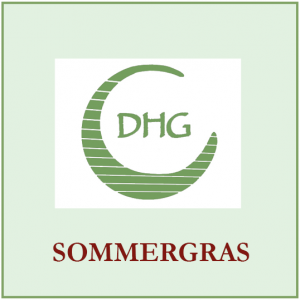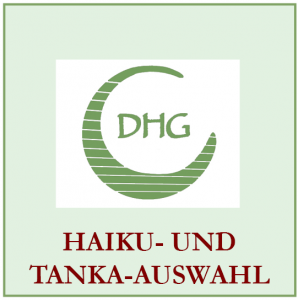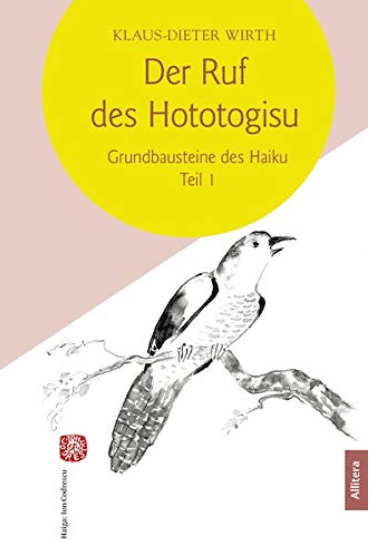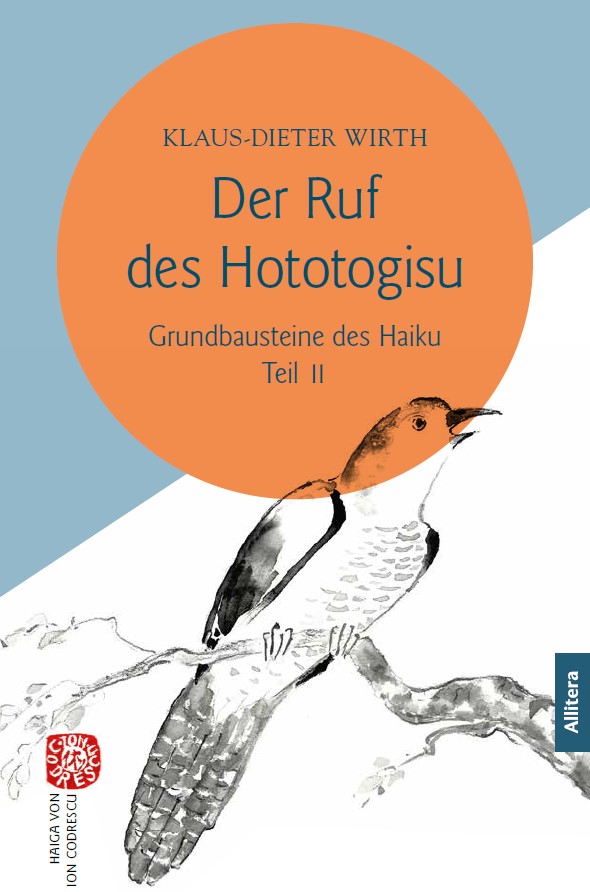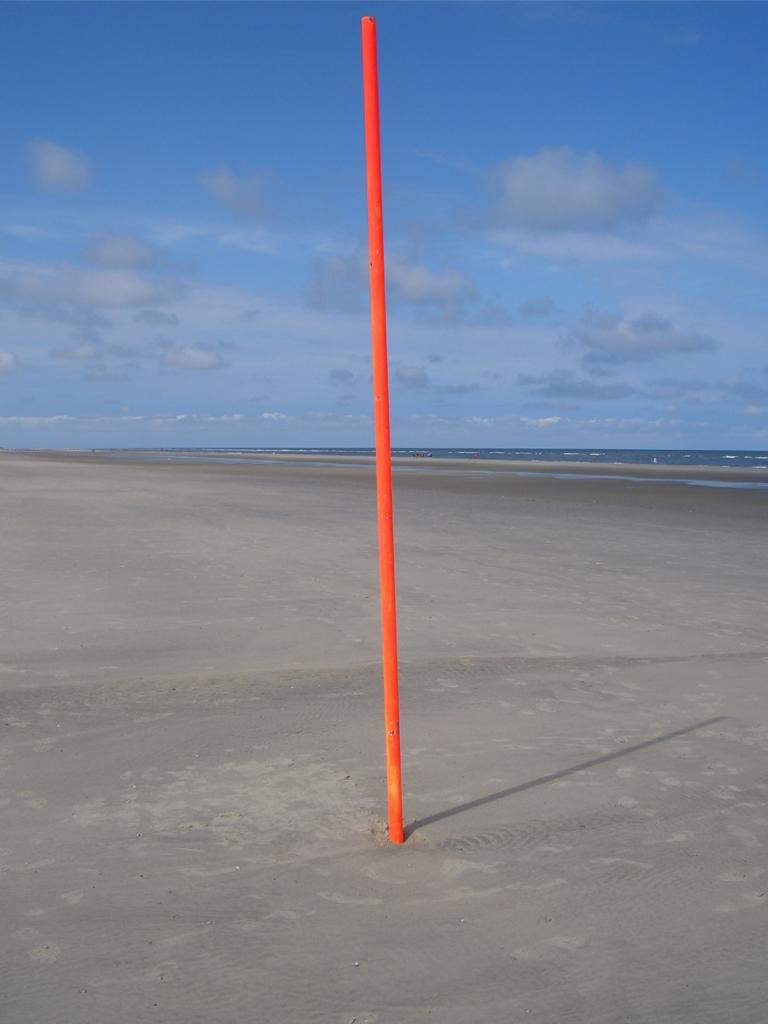Es wurden insgesamt 229 Haiku von 79 Autoren und 36 Tanka von 21 Autoren für diese Auswahl eingereicht. Einsendeschluss war der 15. April 2019. Diese Texte wurden vor Beginn der Auswahl von mir anonymisiert. Jedes Mitglied der DHG hat die Möglichkeit, eine Einsendung zu benennen, die bei Nichtberücksichtigung durch die Jury auf einer eigenen Mitgliederseite veröffentlicht werden soll.
Eingereicht werden können nur bisher unveröffentlichte Texte (gilt auch für Veröffentlichungen in Blogs, Foren, sozialen Medien und Werkstätten etc.).
Bitte vorzugsweise alle Haiku/Tanka gesammelt in einem Vorgang in das Online-Formular auf der DHG-Webseite selbst eintragen:
deutschehaikugesellschaft.de/haiku-und-tanka-die-auswahl/
Der nächste Einsendeschluss für die Haiku/Tanka-Auswahl ist der 15. Juli 2019.
Jeder Teilnehmer kann bis zu fünf Texte – davon drei Haiku – einreichen. Mit der Einsendung gibt der Autor das Einverständnis für eine mögliche Veröffentlichung
in der Agenda 2020 der DHG
sowie auf http://www.zugetextet.com/
und der Website der Haiku International Association (HIA)
Haiku-Auswahl der HTA
Die Jury bestand aus Gregor Graf, Ruth Karoline Mieger und Birgit Schaldach-Helmlechner. Die Mitglieder der Auswahlgruppe reichten keine eigenen Texte ein.
Alle ausgewählten Texte – 32 Haiku – werden in alphabetischer Reihenfolge der Autorennamen veröffentlicht. Es werden bis zu max. zwei Haiku pro Autor aufgenommen.
„Ein Haiku, das mich besonders anspricht“ – unter diesem Motto besteht für jedes Jurymitglied die Möglichkeit, bis zu drei Texte auszusuchen (noch anonymisiert), hier vorzustellen und zu kommentieren.
Da die Jury sich aus wechselnden Teilnehmern zusammensetzen soll, möchte ich an dieser Stelle ganz herzlich alle interessierten DHG-Mitglieder einladen, als Jurymitglied bei kommenden Auswahl-Runden mitzuwirken.
Eleonore Nickolay
Ein Haiku, das mich besonders anspricht
öffnende knospen
die zarten hüllen
der stilleHelga Stania
Ein besonderes Gedicht, sowohl von der Form wie vom Inhalt her, das alle Elemente eines gelungenen Haiku enthält. Es ist kurz, offen, gegenwärtig, ein Hauch von Zen und ein Rätsel zugleich. Das Haiku lässt mich Stille förmlich fühlen.
Es ist Frühling, zarte Knospen öffnen sich allenthalben. In den Kirschblüten ist noch vom Weiß des Winters, und in jeder Blüte wird ein Wunder sichtbar. Lautlos geschieht es Jahr für Jahr, inmitten vom Lärm der Baumaschinen, von Autos und Flugzeugen, dem Klingeln der Handys, Kindergeschrei, Radio und Fernsehen.
Überflutet von all den Reizen, denen wir täglich ausgesetzt sind, sehnen wir uns mehr und mehr nach Stille. Zeiten der Stille sind lebensnotwendig geworden.
Doch was ist Stille? Ein Ort ohne jedes Geräusch? Selbst in einem schallisolierten Raum gibt es noch das Geräusch des eigenen Atems. Das lautlose Wachsen des Apfelbaums? Mit hochempfindlichen Mikrofonen kann man das Zirkulieren der Säfte hörbar machen. Stille im Außen ist nicht möglich. Man kann sie nur im Innern finden, erfahren. Stille ist ein kostbares Gut, etwas Zartes, das leicht gestört wird.
Wie leicht lasse ich mich aus der Ruhe bringen, wenn ich mich gerade einmal in der Stille wähne. Durch einen Wasserhahn, der tropft? Tagsüber habe ich ihn gar nicht bemerkt. Nachts nervt er mich, und ich kann ich nicht schlafen deswegen.
Wie und wo kann ich Stille finden? Vielleicht auf einem Spaziergang im Wald, oder wenn ich auf einen Berg steige, um still zu werden wie der Berg? Vielleicht ziehe ich mich in ein Kloster zurück, übe mich im Sitzen und Atmen, lausche dem Fallen der Blätter im Herbst. In der Stille können sich die Sinne öffnen, ist vieles verborgen, was sich entfalten will. Es kann aber auch sein, dass äußere Stille Unruhe, Ängste erzeugt. Irgendwo habe ich einmal gelesen, wenn es außen still wird, geht der Lärm innen los. Da finde ich die innere Ruhe vielleicht beim Anhören von Musik, beim Malen, Joggen.
Jetzt aber ist Feierabend, und ich will meine Ruhe haben! Im Garten ist es still, der Flieder will duften.
Ausgesucht und kommentiert von Gregor Graf.
Abschied
… auf dem Teller
noch BrotHorst-Oliver Buchholz
Abschied. Bereits dieses Wort am Anfang des Haiku öffnet einen weiten Raum für Erinnerungen und die damit verbundenen Emotionen. Die Autorin/der Autor lässt offen, ob es sich um einen tagtäglichen oder um einen Abschied für längere Zeit handelt. Geht ein Kind zur Schule, die Partnerin zur Arbeit? Verabschiedet sich die Tochter, um ein Studium im Ausland zu beginnen? Die Gefühle, die durch einen Abschied ausgelöst werden, sind so unterschiedlich wie die Gründe für den Abschied.
Sind die vielen Abschiede, die zum Leben gehören, nicht auch eine Vorbereitung auf den endgültigen Abschied?
In der zweiten und dritten Zeile erfahren wir, dass gegessen wurde. Auf dem Teller liegt weder Fleisch noch Gemüse, sondern Brot. In der Symbolik steht Brot u. a. für Gemeinschaft und Leben. Die Brotzubereitung und das Brot als Grundnahrungsmittel waren im europäischen Raum hoch geschätzt. Die Bedeutung des Brotes spiegelt sich im Brauchtum (Backwaren im Jahreszyklus), in Religion, Literatur, Kunst und in zahlreichen Sprichwörtern wider.
In einer Zeit, in der immer mehr Menschen vereinsamen, thematisiert das Haiku den Wert der nährenden Gemeinschaft, ohne zu moralisieren.
In wenigen Worten verweist das Haiku auf existentielle Themen.
Ausgesucht und kommentiert von Ruth Karoline Mieger.
Kindergarten
Die alten Wege
Noch einmal gehenTaiki Haijin
Bewegende vierzehn Silben, ein Abrufreiz in der Eröffnungszeile, der sofort Emotionen weckt, denn Kindergarten wird zum entschlüsselnden (W‑)Ort.
Der Eintritt in den Kindergarten ist die erste einschneidende Veränderung. Raus aus dem Elternhaus! Sich mit Gleichaltrigen auseinandersetzen, Gruppensituationen kennenlernen und mit fremden Regeln zurechtkommen. Neugier, Entdeckungsdrang, freudige Unbeschwertheit machen diesen Schritt in die neue Welt leicht. In jedem von uns gibt es bestimmt den Wunsch, vor allem wohlwollend besetzte Erinnerungen hinüber ins Erwachsenendasein retten zu wollen. Fröhlichkeit, Lieder im Morgenkreis, Lob für ein besonders gelungenes Bastelstück, ausgelassenes Toben, interessante Spielgeräte, spannende Ausflüge … und so weiter. Aber wer kennt nicht auch die andere Seite, diese Wellen aufwallender Gefühle? Ängstliches Herzklopfen in der fremden Umgebung, schreibt sich genauso in mein Selbstbild ein und hat möglicherweise Einfluss darauf, wie ich mich im späteren Leben verhalte. Da mischt zum Beispiel die Angst vor Stärkeren mit, da brodelt Wut, dass ich mich nicht gewehrt habe, oder es flammt Enttäuschung auf, weil mir niemand geholfen hat. Da rollen Tränen, weil ich wieder nicht mitspielen durfte, und da ist das schamhafte Gefühl bei Hänseleien, am liebsten in den Boden versinken zu wollen.
Die alten Wege öffnen Erinnerungsfenster, sie führen in autobiografische Erfahrungen hinein, die mit verstandesmäßigen Möglichkeiten allein nicht zu beschreiben sind. Vieles aus einer Zeit, zu der ich nur bruchstückhaft bewussten Zugang habe, wird vom Gedächtnis in den Körper eingebrannt, weil intensive Erinnerungen an Menschen und prägende Erlebnisse daran geknüpft sind. So kann auch ein konkreter Ort, dessen äußeres Gesicht sich vielleicht im Laufe der Zeit stark verändert hat, Jahre, sogar Jahrzehnte später, im inneren Erleben wieder verloren geglaubte Einzelheiten, Geräusche, Gerüche, plastische Bilder sowie Empfindungen lebendig werden lassen …
Die Großschreibung beim Einstieg mittels Die in die zweite und Noch in die dritte Zeile unterstreicht jeweils die unmittelbare Präsenz des Erinnerten, als hätte sich weder ein zeitlicher noch gefühlsmäßiger Abstandshalter zwischen Gegenwart und Vergangenheit geschoben. Vieles ist sichtlich angesprochen, ohne dass es explizit ausgesprochen werden muss. Es geht nicht vorrangig um nostalgische Gefühlsduselei. Genauere Beweggründe für diese Rückblende in die Kindheit erfahre ich allerdings nicht.
Vielleicht gezielte Spurensuche während eines Besuches? Es könnte also sein, jemand ist zurückgekehrt, um mit einem Stück persönlicher Geschichte Frieden zu schließen, oder um über die Verbundenheit zum Heimatort in einer gegenwärtigen Lebenskrise sozialen Rückhalt zu finden. Es ist jedoch auch durchaus vorstellbar, gemeinsam mit dem Sohn, der Tochter, vielleicht auch einem Enkelkind, zum ersten Mal auf ‚den alten Wegen‘ unterwegs zum Kindergarten zu sein.
Ein gängiger Ausspruch, wenn früher Verwandte kamen: „Mensch, du bist aber groß geworden!“
Jeder trägt seine Erinnerungen mit sich an die eigene Kindheit und auch an die Zeit, wenn man die eigenen Nachkommen wachsen und aus den Kinderschuhen herauswachsen sieht … Die Sehnsucht nach Zugehörigkeit ist tief in uns verwurzelt. Und da wünsche ich mir gerade doch umso mehr, dass viele Erinnerungsschätze im Gedächtnis verankert sind.
Ausgesucht und kommentiert von Birgit Schaldach-Helmlechner
Die Auswahl
Verkehrsstau –
eine kleine Hand zaubert
lächelnde GesichterValeria Barouch
Waldhimbeeren
wieder werde ich mich
verspätenChristof Blumentrath
Jahrestreffen
wir graben uns durch
die erste SchichtChristof Blumentrath
Ankunft der Stare
Punkt für Punkt
aufs PapierMarcus Blunck
die Nacht taut –
in den Scheiben spiegelt sich
altes und neues LichtGerd Börner
Frühlingserwachen …
in der Sonne verblasst
eine PlastiktulpeHorst-Oliver Buchholz
bienensterben
der clown pflückt
eine imaginäre blumeFrank Dietrich
Regenguss
die Tulpen verneigen sich
vor den VeilchenHildegard Dohrendorf
als hätten sie alles
verstanden in diesem Winter …
KirschblütenBernadette Duncan
Schöner Wohnen
ins Altpapier – der Mond
auf seinem WolkenbänkchenBernadette Duncan
Im Straßengraben
die ersten bunten Tupfen
PlastiktütenSusanne Effert-Hartmann
Lebenslinien
am Stellwerk
ranken RosenHans-Jürgen Göhrung
Am Meer
in seinem Rauschen
verstummen GedankenWolfgang Gründer
Kindergarten
Die alten Wege
Noch einmal gehenTaiki Haijin
beim Wegkreuz
verharren – nichts weiß ich
von ihmGabriele Hartmann
lunare Landschaft
seine Hände mischen
Wasser und MehlGabriele Hartmann
über den friedhof …
„unvergessen“
nur die rabenBernhard Haupeltshofer
Mairegen
auf dem Gesicht der alten Frau
ihr MädchenlächelnAnke Holtz
seidenblaue Nacht
flüstere einen Wunsch
in das Ohr des MondesAnke Holtz
Chopins Walzer –
schweben, schweben …
im FliederrauschIlse Jacobson
Buschwindröschen schon
im Kalender rot markiert
deine AnreiseSilvia Kempen
erster Schnee
der Duft des
neuen LichtsGérard Krebs
Kloster auf Zeit –
ein Fenster öffnen
für die StreunerinEva Limbach
Wohnungsauflösung …
in der Zigarrenkiste
das Foto von mirEva Limbach
blinder Spiegel
tief in mir die Melodie des alten KinderliedesRamona Linke
Stadtbummel …
die Kirschen blühen
auf blickdichter VerglasungRamona Linke
Fensterplatz
ihr Blick wandert
über Windows-DateienEleonore Nickolay
heimatlos –
suche den Kirchturm
am HorizontAngelica Seithe
das licht
erloschener sterne
holzkreuzeHelga Stania
öffnende knospen
die zarten hüllen
der stilleHelga Stania
Morgennebel
ein Sonnenstrahl trifft
meine FrühlingsträumeBrigitte Weidner
im Rollstuhl
heute wieder acht Käfer
verschontFriedrich Winzer
Tanka-Auswahl der HTA
Tony Böhle und Silvia Kempen wählten vier Tanka aus.
„Ein Tanka, das mich besonders anspricht“ – unter diesem Motto werden Texte vorgestellt und kommentiert.
Ein Tanka, das mich besonders anspricht
Vaters Hand
auf meiner Schulter
zum Ritter schlagend
mit flacher Klinge den Sohn
der ich nie warGabriele Hartmann
Anlässlich des Pfingsttages veranstaltet Kaiser Friedrich I Barbarossa im Jahr 1184 in Mainz einen Hoftag, in dessen Rahmen seinen beiden Söhnen Heinrich und Friedrich eine besondere Ehre zuteil wurde. Die beiden jungen Männer erhielten von ihrem Vater und Kaiser persönlich die Schwertleite. War dieses Ritual damals vor allem als dynastischer Herrschaftsanspruch der Staufer gedacht, hat sich der Ritterschlag bis heute als Anerkennung für besondere Leistungen in unserer Sprache erhalten. Ist die Zeit der gepanzerten Reiter auch schon seit Jahrhunderten vorüber, gibt es in Großbritannien die Adelung mit dem Schwert durch den Monarchen noch bis heute, wenn auch mit einer anderen Bedeutung.
Wird man sich der enormen symbolischen Bedeutung bewusst, lässt sich wohl erst erfassen, welche Bedeutung das lyrische Ich dem nach außen wohl eher trivial anmutenden Schulterklopfer des Vaters beimisst. Bei der genaueren sprachlichen Betrachtung lassen sich dafür Anhaltspunkte finden. Die väterliche Hand wird zur flachen, aber gleichwohl scharfen Klinge eines Schwertes stilisiert. Sie kann nicht nur symbolisch ehren, sondern auch verletzten, Gliedmaßen oder gar Köpfe abtrennen – ganz nach dem Ermessen ihres Besitzers. Dieser Vergleich deutet eine Ambivalenz in der Vater-Sohn-Beziehung an, irgendwo zwischen Furcht vor der Strenge des Vaters und dem Wunsch nach Anerkennung.
Ein weiterer Grund, weshalb das Tanka eine eindrückliche Wirkung hinterlässt, ist die Hinleitung zur letzten Zeile, in der der Text seinen Gipfelpunkt findet. Hatte der Schulterklopfer „mit flacher Klinge“ bereits atmosphärische Störungen anklingen lassen, wird der Grund dafür nun deutlicher zutage gefördert. Das lyrische Ich selbst bezeichnet sich als „den Sohn / der ich nie war“. Ob es ein schmerzlicher Blick auf das eigene (Fehl)-Verhalten ist oder ein Empfinden, das ihm der Vater gegeben hat, bleibt unklar. Aber auch eine weitere Lesart ist durchaus denkbar: Sucht und sieht der alt gewordene Vater im lyrischen Ich vielleicht den Sohn, den er sich immer gewünscht hat, eine Art von Sohn, die das lyrische Ich aber nie war oder sein wollte? Man wäre wohl gespannt darauf, mehr zu erfahren, aber alles, was für ein herausragendes Tanka nötig ist, wurde schon ausgesprochen. Ein Mehr an Hintergründen, an Erklärungen oder Begründungen würde dem Siedepunkt dieses Augenblicks nur Kraft nehmen.
Ausgesucht und kommentiert von Tony Böhle
Die Auswahl
Am Steilhang
beugt sich mein Haupt
schweißgetränkt
vor der Butterblume
gekrönt vom MorgentauValeria Barouch
Mondlicht
auf dem Kissen
neben mir
ob ich mich umdrehe
oder nichtFrank Dietrich
Vaters Hand
auf meiner Schulter
zum Ritter schlagend
mit flacher Klinge den Sohn
der ich nie warGabriele Hartmann
um etwas Salz
bittet der neue Nachbar
und verbreitert den Weg
von seiner
zu unserer TürGabriele Hartmann
ich habe Angst
dass mir die Zeit davonläuft
und ich eines Tages
überrascht erkennen muss
alle Uhren stehen stillErika Uhlmann


